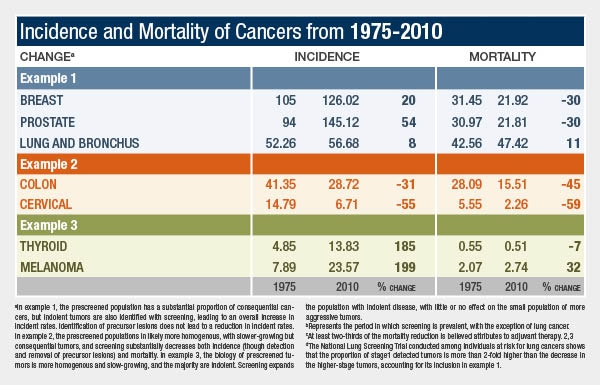By contrast, the authors said, colon and cervical cancer serve as examples of “effective screening programs in which early detection and removal of precancerous lesions have reduced incidence as well as late-stage disease.”
Cancer screening should have three important missions, the authors write: To detect disease that would ultimately harm the patient; to uncover tumors that benefit from intervention; and to detect disease that is more likely to be cured or better treated when spotted early.
Optimal screening frequency depends on a cancer’s growth rate. If a cancer is fast growing, screening is less likely to be effective. “If a cancer is slow growing but progressive, with a long latency and a precancerous lesion, screening is ideal and less frequent screening (eg.10 years for colonoscopy) may be effective,” the authors said.
The recommendations include:
- Recognize that screening will identify indolent cancers.
- Change terminology and omit the word “cancer” from premalignant/indolent conditions;
- Convene a multidisciplinary body to revise the current taxonomy of cancer and to create reclassification criteria for indolent conditions;
- Create observational registries for lesions with low potential for malignancy – generate the data to provide patients and their doctors “with confidence to select less invasive interventions;”
- Develop, validate and adopt molecular diagnostic tools that identify indolent or low-risk lesions;
- Mitigate overdiagnosis: appropriately reduce frequency of screening exams while focusing on high-risk populations, and raise the threshold for patients being recalled for re-testing and biopsy.
“Although no physician has the intention to overtreat or overdiagnose cancer, screening and patient awareness have increased the chance of identifying a spectrum of cancers, some of which are not life threatening,” the authors wrote. “The ultimate goal is to preferentially detect consequential cancer while avoiding detection of inconsequential disease.”
Pages: 1 · 2
More Articles
- National Institutes for Health Study Offers Insights Into How Cells Reverse Their Decision to Divide
- Women Firefighters Face High Exposure to Toxic ‘Forever Chemicals’ Known to Interfere with Immune and Endocrine Functions and Breast Development
- A Most Unique Statement From FDA Commissioner Scott Gottlieb, M.D., On Efforts to Safeguard Women’s Health From Deceptive Health Claims and Significant Risks Related to Devices Marketed for Use in Medical Procedures for “Vaginal Rejuvenation"
- Cover Up! Environmental Working Group's (EWG) 12th Annual Sunscreen Guide
- "A Whole New Dimension to Immune Therapy": Getting a More Robust Immune Reaction Against a Tumor
- After 55: Changing to Every Other Year for Mammograms
- Editorial in JAMA Journal Oncology: Rethinking the Standard for Ductal Carcinoma In Situ Treatment
- 5th White House Science Faire; The Theme? Diversity and Inclusion in STEM
- Congressional Bills Introduced: IRS & Trafficking, Ratifying CEDAW; Campus Sexual Violence; Tax Credits
- The Last Part of Our Journey Together






